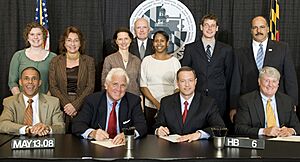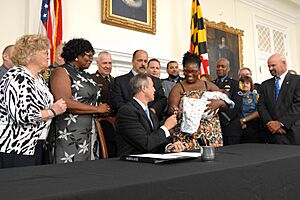Curt Anderson facts for kids
Quick facts for kids
Curt Anderson
|
|
|---|---|
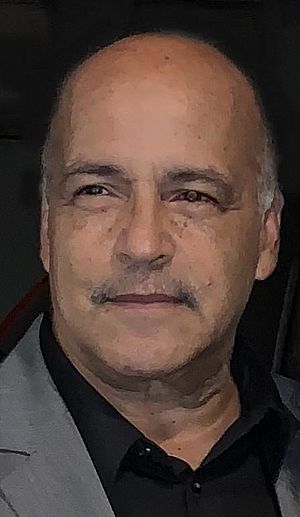 |
|
| Member of the Maryland House of Delegates from the 43rd district |
|
| In office January 8, 2003 – January 11, 2023 |
|
| Preceded by | Ken Montague, Michael Dobson |
| Succeeded by | Redistricting |
| Constituency | Baltimore, Maryland |
| Member of the Maryland House of Delegates from the 44th district |
|
| In office January 12, 1983 – January 10, 1995 |
|
| Preceded by | Torey Brown, Frank Robey |
| Succeeded by | Ann Marie Doory |
| Personal details | |
| Born |
Curtis Stovall Anderson
October 12, 1949 Chicago, Illinois, U.S. |
| Political party | Democratic |
| Spouse | Divorced |
| Relations | Shani Davis (cousin) |
| Children | Ambre Anderson, Curtis Ian, Damien, Christian |
| Residences | Baltimore, Maryland |
| Occupation | Attorney |
Curtis Stovall Anderson, born on October 12, 1949, is an American politician and lawyer. He also used to be a news reporter. He served as a lawmaker in the Maryland House of Delegates for many years. He was first elected in 1983 and served for 12 years. Later, he was elected again in 2002 and continued to serve until he retired in 2023.
During his time as a delegate, he was the leader of the Baltimore City Delegation. He also led the Legislative Black Caucus of Maryland, a group of African-American lawmakers. Mr. Anderson was also chosen to represent his party at the Democratic National Convention in 1992 and 2008.
Contents
Early Life and School
Curt Anderson was born in Chicago, Illinois. His parents were Leonard and Jean Anderson. In 1952, his family moved to Baltimore, Maryland. His father became a Dean at Morgan State University.
Getting an Education
Anderson went to elementary schools in Baltimore and Glencoe, Illinois. In 1964, he started at Baltimore City College. He was a great athlete there, leading both the football and track teams. He even earned a scholarship to Rutgers University.
He studied political science at Rutgers. Later, in 1973, he went to Morgan State University. He earned a bachelor's degree in political science. He also played on the famous "Ten Bears" lacrosse team. This was the only black college lacrosse team in the United States. After working in television, he went to University of Baltimore Law School in 1982. He earned his law degree there.
Working Life
News Reporter
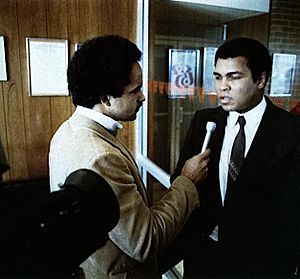
Before he became a politician, Curt Anderson worked as a news anchor. He reported the news for WMAR-TV and WBAL-TV in Baltimore. He started at WBAL in 1976 as a reporter. He often covered news from the state legislature and Baltimore City Hall. He even interviewed the famous boxer Muhammad Ali in 1978.
In 1980, he moved to WMAR-TV. He became their weekend news anchor. He reported on big events like the Wayne Williams trial in Atlanta. In 1982, he left WMAR-TV. He decided to stay in Baltimore with his family. He then started law school and ran for the House of Delegates.
Becoming a Lawyer
Anderson finished law school in 1987. He passed the Maryland Bar Exam in 1988, which meant he could practice law. He joined a law firm and worked as a lawyer helping people accused of crimes. In 1996, he opened his own law office. He has helped many people in courts across Maryland. He even argued a case in front of the highest court in Maryland, the Supreme Court of Maryland.
Being a Lawmaker
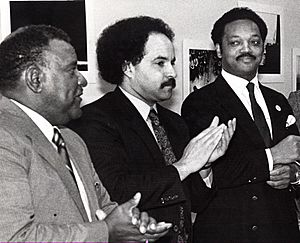
In 1982, Curt Anderson won a seat in the Maryland House of Delegates. He was sworn in as a delegate in January 1983. He worked on the House Ways and Means committee.
After serving for five years, he became the chairman of the Legislative Black Caucus of Maryland. As chairman, he helped pass Maryland's Minority Business Enterprise Act. This law helped minority-owned businesses get more opportunities. For example, nearly 20% of the contracts for building Oriole Park at Camden Yards went to minority businesses.
In 1993, Anderson was part of the committee that planned the 1993 Major League Baseball All-Star Game in Baltimore. He helped arrange for the HBCU Morgan State University Choir to perform. He also worked with BET to host a step show competition for local black fraternities.
After 12 years in the House, Anderson ran for the Maryland Senate in 1994 but was not elected. He practiced law for the next eight years. In 2002, he ran for the House of Delegates again and won. He was re-elected in 2006.
In May 2020, the new Speaker of the Maryland House of Delegates, Adrienne A. Jones, asked Anderson to join a special group. This group worked on making big changes to Maryland's police accountability laws.
Views on Gambling
Since 2003, Anderson was known for being against slot machines in Maryland. He organized protests and spoke out against bringing gambling into the state. Even though the Governor at the time, Robert Ehrlich, supported slots, Anderson and his colleagues stopped the bill from passing in the House of Delegates. In 2005, different versions of the bill passed both chambers. When Martin O'Malley became Governor in 2007, he also considered slots for state money. But Anderson continued to strongly oppose them.
Important Laws He Helped Pass
- 1989: He sponsored a law (HB 1303) about cars being towed from private parking lots in Baltimore. The new law made sure lots had to post warnings and tell car owners where their vehicles were towed.
- 1990: He sponsored a law (HB 1540) that created a fair way for minority businesses to get state contracts in Maryland. He also sponsored HB 328, which allowed retired judges to come back and help with busy court cases for up to 90 days.
- 1991: Anderson sponsored Maryland's first law about DNA profiling (HB 1150). This law set rules for how DNA evidence could be used in criminal trials.
- 1992: His bill, HB178, became law. It required that interpreters be provided in all Maryland courts for people who do not speak English.
- 1994: Anderson tried to pass a bill to raise the age for dropping out of public school from 16 to 18. It didn't pass then, but the same bill became law in 2012.
- 2007: He sponsored a law to make sure the state's forensic labs were properly monitored (Chapter 147). This helped ensure that scientific evidence was reliable. He also sponsored HB 1071, which created teams to review child deaths to help prevent them (Chapter 264).
- 2008: During this year, Anderson sponsored the Custodial Interrogation Act. .....
- 2010:
Anderson was the main sponsor of Maryland's "BLUE Alert" system (HB 1473). This system is like an AMBER alert but is used when a police officer is killed or seriously hurt and the person responsible is still at large. Governor O'Malley signed this bill into law.
- 2011: He sponsored HB 241, which added shotguns and rifles to the list of weapons requiring a mandatory sentence. It also increased the sentence to 15 years in prison. His HB 302 changed how parole decisions were made for life sentences. It gave more power to the parole board.
- 2012: As chairman of the Baltimore City Delegation, Anderson helped pass HB 860. This law approved $1.1 billion to build new schools in Baltimore City.
- 2015: Anderson was the main sponsor of the Second Chance Act. This law allows people with certain minor convictions to have them hidden from public view. .....
Groups and Committees
Curt Anderson has been part of many important groups and committees:
- 2020: Appointed to a group working on police reform in Maryland.
- 2016–2019: Maryland Police Training and Standards Commission.
- 2015: Chaired a group on public safety and police practices.
- 2014–2015: Appointed to study body cameras for Baltimore police officers.
- 2012–2014: Appointed to groups studying legal rulings about public defenders and the liability of pit bull owners.
- 2009–2016: Baltimore Convention and Tourism Board.
- 2003–2019: Served on the Maryland State Commission on Criminal Sentencing Policy.
- 2000–2010: Board of Directors, Northwood Baseball League (Baltimore).
- 1989–1995: Governor's Commission on Maryland Military Monuments.
- 1978–1982: Board of Trustees, Provident Hospital, Baltimore.
Awards and Honors
- 2008: Legislator of the Year - Office of the Maryland Public Defender
- 2009: Humanitarian of the Year - Maryland Restorative Justice Initiative
- 2010: Named one of the Most Influential Maryland Legislators (Top 20)
- 2010: Legislator of the Year - Maryland Fraternal Order of Police
- 2011: Alumnus of the Year (shared) - Baltimore City College
- 2013: Inducted into the Baltimore City College Hall of Fame
 | William M. Jackson |
 | Juan E. Gilbert |
 | Neil deGrasse Tyson |


